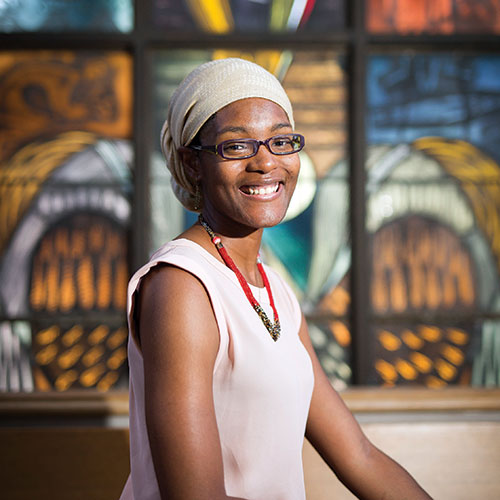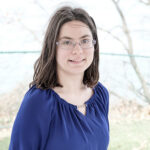
Vocation for All Voices: UMC Reverend chooses joy to equip congregations and transform community-building relationships

Joy E. Bronson ’07 insisted from a young age that she wouldn’t be following in her father’s and grandfather’s footsteps as a pastor because she “didn’t want to run a church.” Up until her second semester at The College of Wooster, Bronson’s plan was to pursue a career as an obstetrician-gynecologist. The entry-level science class rosters filled up before she could join them. Her friends who got in were stressed and got almost no sleep. “I thought, ‘If this is what it means for me to become a doctor, I have to rethink if the Holy Spirit wants me to be an OBGYN,’” recalled Bronson.
This act of rethinking proved to be a positive common thread in Bronson’s time on campus and thereafter. She rethought her major, moving from pre-med to English and Africana studies. She rethought leaving Wooster to travel and serve with AmeriCorps after sophomore year because one of her favorite professors, Jeff Roche, professor of history, encouraged her to push through and finish the degree program first. And she rethought joining the clergy when she realized it could be less about running a church and more about the intentionality of connecting people within a community to promote equity, justice, and relationships.
“Who we are is in us from the moment we’re born,” said Bronson. “Our soul knows it, and our life’s journey is just figuring it out.” Almost 15 years after leaving Wooster, she’s still figuring it out, but with far greater confidence. The now Rev. Bronson is a United Methodist Deacon helping individuals, teams, and communities discern and refine their own calling and/or institutional vision. Simply put she’s a calling and vocation coach who seeks to support fulfilling the next iterations of greatness.
“Vocation is not your job; it’s your life’s work,” said Bronson. “Theologian Frederick Buechner said our vocation is ‘where our greatest joy meets the world’s greatest need.’ I retranslate that to ‘where our passions and gifts meet the needs and opportunities of the communities that we serve.’”
At American Baptist College in Nashville, Tennessee, Bronson oversees two Lilly Endowment-funded projects: a $1.5 million Called to Lives of Meaning & Purpose grant and a $1 million Thriving Congregations initiative. She integrates theology, equity, design thinking, and evaluative learning to help churches both understand their passions (their vocation and their gift) and develop a process to be intentional about meeting the needs of the communities they serve.
Many of these ministries are already justice- and community-focused, but a lot of churches—and organizations—get stuck in charity mindsets, according to Bronson. While charity is necessary, as it fills a basic need, it’s usually reactive. Instead, Bronson and her colleagues facilitate relationship building in a more comprehensive approach that doesn’t assume needs—or assume the community needs someone to fix it.
“Most of inequity and social injustice is a result of communities being segmented off and folks saying, ‘this is your problem, not our problem,’” declared Bronson. “The reality is there are ways we may be functioning in our part of the community that’s actually generating a negative impact elsewhere.”
To be clear, she isn’t saying congregations or organizations need to be fixed, but “We need to be honest and mindful that we create problems by leaving important voices out of the conversation.” Bronson’s advocacy enforces the need for relationship to see the bigger picture and ultimately, make a bigger impact. She experienced the benefit of this kind of relational impact firsthand at Wooster.
“I think Wooster’s vocational ethic is that people care about who you are as a whole person, and that ripples through everything on campus,” said Bronson. “The professors didn’t pretend it was just a grade. We talked about life and how we show up in the world. Even the Independent Study is a vocational invitation because you’re challenged to pick a question you want to sit with for the rest of your life.”
“I think Wooster’s vocational ethic is that people care about who you are as a whole person, and that ripples through everything on campus. The professors didn’t pretend it was just a grade. We talked about life and how we show up in the world.”
—Joy E. Bronson ’07
Bronson is replicating this kind of intentionality in her congregational appointment at Glencliff United Methodist Church. She facilitates the staff strategic planning process defining and refining mission, vision, and values. Before Bronson’s arrival, Glencliff was a merger between two dying churches. Under new pastorship a few years ago, the congregation became the center of a city-wide collaborative to build micro homes on its campus for persons experiencing homelessness after medical care. Now that that project is largely underway and in its staff ’s capable hands, its members are thinking about how they can show up and who they can serve next.
Having applied for full ordination at the end of 2021, Bronson hopes to finish the seven-year process within the coming months. “I know plenty of congregations doing great things, not just Glencliff, but I’m blessed to be here,” said Bronson. “So much has happened in the last five years. Now we have to figure out who we are and what we do next.” Bronson has plans to keep showing up, too. She’s launching a consultancy, Vision: Justice, later this year both as a grounding space for her work, but also as a conversation and partnership hub for equity justice practitioners to continue to refine the work together.
Posted in Alumni on March 1, 2022.
Related Posts
Related Areas of Study
Religious Studies
An interdisciplinary, academic approach to the study of religion that includes history, art, theology, and more.
Major MinorEnglish
Students benefit from the small classes and access to faculty members in the small private liberal arts setting at Wooster.
Major MinorAfricana Studies
An interdisciplinary approach to interpreting the lives and experiences of the world's Black women and men.
Major Minor

